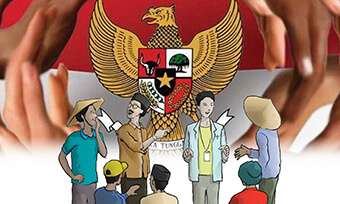
Several cases/problems that have surfaced recently also need attention. Although interpretation and application of the Pancasila precepts may vary among individuals, communities and political factions in Indonesia, Pancasila values continue to be at the heart of discussion and policy-making around national issues, serving as a guiding framework for overcoming challenges while upholding high unity and diversity of the country.
Indonesia is famous for its religious and cultural diversity, with a majority Muslim population but also many adherents of Christianity, Hinduism, Buddhism and other religious groups. Pancasila values which promote unity in diversity and respect for differences in religious and cultural backgrounds play an important role in maintaining social harmony in the country. Issues related to religious tolerance, interfaith relations, and the protection of minority rights continue to be a concern.
The Pancasila principle of “Social justice for all Indonesian people” underscores the importance of addressing economic disparities and ensuring that the benefits of development are shared widely. Issues related to poverty, income inequality, and access to education and health services are major challenges in Indonesia and are directly related to this principle.
Along with the increasing prominence of environmental issues globally, these issues are also becoming relevant for Indonesia. The principle of “fair and civilized humanity” can be linked to efforts to protect the environment and natural resources. One of the values in it is also high morality. Corruption is a serious problem in Indonesia, and Pancasila can be used as a moral foundation to tackle corruption by promoting transparency, accountability and ethics in government and the private sector.
The Fourth precept, which puts forward the Pancasila principle of “Democracy guided by consensus”, reflects Indonesia’s commitment to democratic governance. Issues related to political reform, electoral integrity, and the protection of civil liberties are important issues in Indonesia’s political landscape.
It’s not only political life that continues to heat up and be in the spotlight, human rights issues have become a concern in Indonesia, including freedom of expression, freedom of the press, and protection of minority rights. The principle of “Social justice for all Indonesian people” includes the protection of individual and collective rights, and debates on these issues often refer to Pancasila values.
Balancing the principle of “Indonesian Unity” with regional autonomy and local identity is an ongoing challenge. Problems related to separatist movements in certain areas and efforts by the central government to maintain national unity and unity are examples of the application of the Pancasila precepts in the context of diversity.
Pancasila can serve as a powerful framework to guide social, political and economic action in dealing with various social problems. However, it is important to remember that implementing Pancasila values in practice is often a challenge, and the role of civil society, government, and social institutions in promoting and living these values is critical to achieving this goal.
Have you practiced the values of Pancasila today?
If you want to get leadership training about practicing Pancasila in the world of business and work for your company or institution, don’t forget to check our list of services at https://campsite.bio/indonesiahebat
Also keep an eye on our social media for other interesting information. Mari bersama kita melangkah menuju Indonesia hebat!
